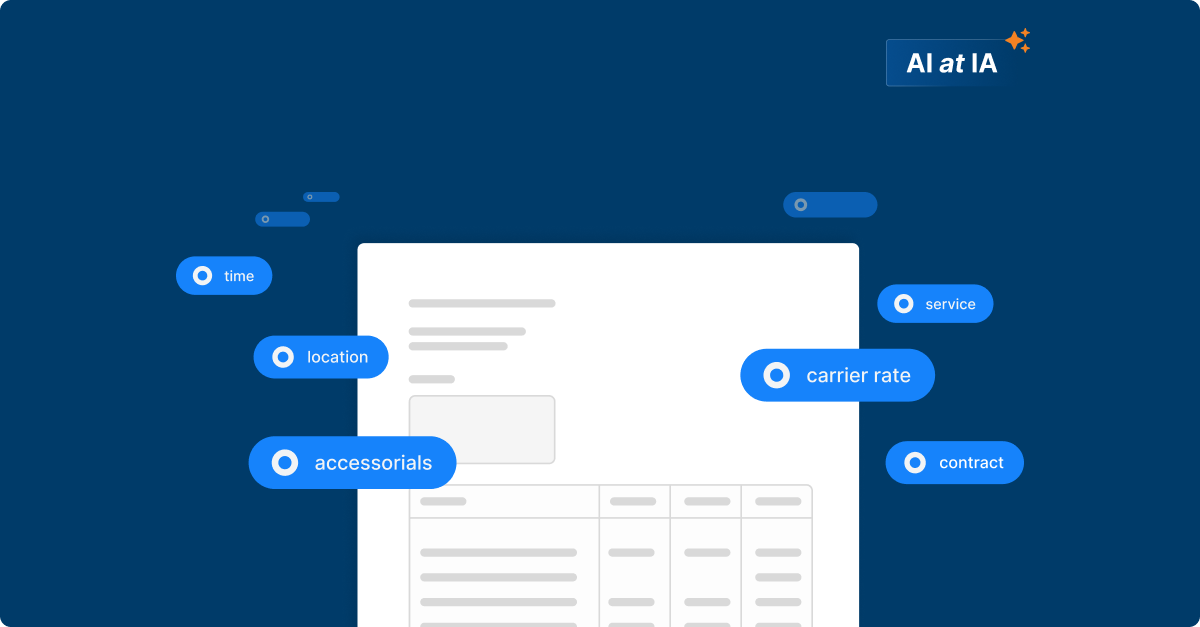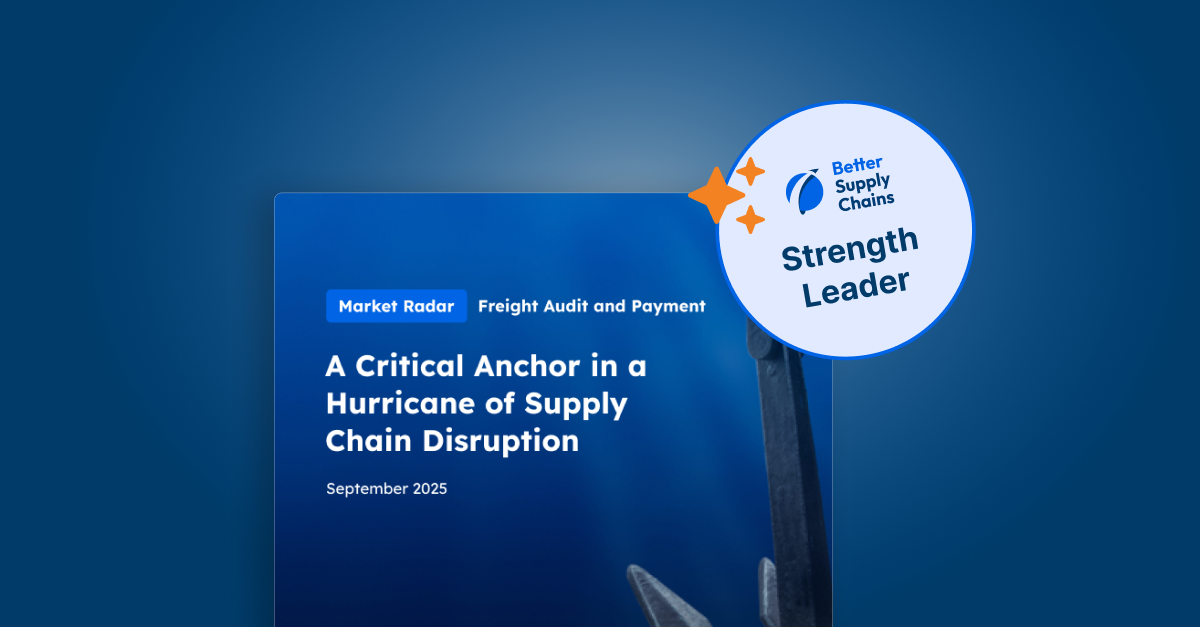The True Cost of Disruption: Building Transparent Processes Through Streamlined Freight Auditing

You stare at your computer screen, rubbing your tired eyes. The quarterly review is tomorrow, and your freight costs are through the roof — again. You can hear your CEO's voice: "What's going on with these numbers?" As you dig deeper into the data, a pattern emerges. Those LTL shipments to the Midwest are consistently misclassified, and the detention charges from that new carrier are adding up fast. You realize this isn't just about catching errors anymore — it's about uncovering insights that could reshape your entire logistics strategy.
Suddenly, your phone vibrates. A tropical storm has shut down a major port, and half your inbound shipments are now in limbo. As you scramble to find alternatives, you wish you had a clearer picture of the true cost of these disruptions. How much are these constant fire drills costing your company? If only you could show your execs exactly how streamlined freight auditing could provide the visibility you desperately need.
Reactive thinking won't cut it anymore, but with a strong, data-driven auditing process, you could transform from a cost center manager into a strategic powerhouse — predicting disruptions, mitigating risks, and keeping customers happy even when the supply chain world is falling apart.
The Escalating Impact of Supply Chain Disruptions
Supply chains, once a behind-the-scenes player, have taken center stage in the global economy. These days, there’s a magnifying glass on it because its disruptions are the reason behind empty shelves, crazy prices, and why your customers are still waiting on that package they ordered weeks ago. Let's break down the chaos and see how it's messing with your wallets and the world around us.
Global Surge in Supply Chain Disruptions
Big companies are constantly putting out fires every 3.7 years when a major supply chain disaster drags on for weeks or months. It's like clockwork — executives find themselves huddled in war rooms, scrambling to keep their businesses running.
These crises force tough choices. Slow down production? Stockpile inventory? Raise prices? There's no perfect solution, and often, it's the everyday consumers who feel the pinch. You see it in bare shelves, longer shipping times, and steeper price tags on everything from electronics to groceries.
Cybercriminals aren't helping, either. They've ramped up their attacks on supply chains by a whopping 30% compared to last year, causing widespread shortages and delays that extend far beyond a single company. Then, there's the perfect storm of labor strikes, natural disasters, and geopolitical tensions, leaving 43% of manufacturers struggling to maintain normal operations. Empty shelves, longer wait times, and a growing sense of frustration for both businesses and customers are a natural byproduct.
Financial Consequences for Businesses
The financial toll of these disruptions is enough to make even the most seasoned CEO break out in a cold sweat. We're not talking about minor setbacks — we're looking at potential economic losses that could slash industrial production by 4% to 5% in the coming years.
Climate change is amplifying these challenges to an alarming degree. Projections show that supply chain chaos, fueled by our changing climate, could lead to eye-watering economic losses ranging from $3.75 trillion to $24.7 trillion by 2060.
The situation is particularly dire for consumer goods companies. Bottlenecks at major ports have created a domino effect of delays and increased costs. These disruptions force businesses to choose between eating into their profits or passing costs onto already-strained consumers.
The Hidden Costs of Inefficient Freight Auditing: More Than Meets the Eye
You might think freight auditing is just a routine task, but the reality packs a punch to your bottom line. From billing blunders to wasted hours, inefficient auditing practices can drain your resources faster than a leaky cargo container.
Billing Errors and Overcharges: A Costly Game of Hide and Seek
Imagine this: You're running a tight ship, watching every penny, only to discover that up to 80% of your freight invoices are error-ridden. It's like finding out your trusted accountant has been sneakily pocketing your loose change for years. These aren't just minor slip-ups; we're talking about a 10%+ loss through overpayments.
The kicker? About 10% of shippers and 3PLs still rely on manual auditing. While they might think they're saving money, they're actually bleeding cash. Liftgate fees, inside delivery costs, and stop-off charges are like gremlins, multiplying when you're not looking. Before you know it, these little extras have ballooned into a significant chunk of your freight bill. Without a sharp eye and a system to track them, you might as well be setting your money on fire.
Time Suck and Resource Drain: When Efficiency Takes a Vacation
Now, let's talk about time — that precious commodity we never have enough of. Manual freight auditing is like a black hole for productivity. Each invoice can suck up to 30 minutes of someone's day. Multiply that by hundreds of invoices a month, and suddenly, you've got a full-time job just checking bills. Worse? Companies still clinging to these archaic methods are flushing up to 5% of their total freight spend down the toilet on administrative costs alone. That's not chump change — we're talking serious dough that you invest in growth, innovation, or even an office pizza party.
All this inefficiency also costs you opportunities. While a mountain of paperwork buries your team, your competitors are out there innovating, expanding, and eating your lunch. The good news? Automated solutions can slash these costs by up to 80%. Imagine what you could do with all that freed-up time and money. New markets to conquer, enhanced customer experiences, or a good night's sleep without freight invoice nightmares.
Benefits of Streamlining Freight Auditing for Transparency
You're drowning in another parcel invoice audit, eyes glazing over as you try to make sense of the jumbled numbers. It feels like a losing battle, right? Well, you're in good company. A staggering 80% of carrier invoices contain errors in the maze-like world of global shipping. The good news? Automated freight audit solutions are here to save your sanity — and your budget.
Slashing Costs and Squashing Errors
Imagine your shipping department breathing a collective sigh of relief as they ditch the mountains of invoices. That's the magic of automated freight auditing. It's like finding spare change in your couch cushions, but way better — we're talking a 2% to 5% cut in transportation costs. And your team? They're grinning from ear to ear, finally free from mind-numbing paperwork. They're diving into projects that actually matter, slashing operational costs by a whopping 80% and overhauling how you do business for the better.
These automated systems are like having a team of accountants who never need coffee breaks. They pore over every invoice, sniffing out those sneaky incorrect fees, exceptions, and discrepancies that used to slip through the cracks. With AI and blockchain joining the party, your accuracy hits a jaw-dropping 99% — no more late-night panic about messed-up data or financial slip-ups. You can kick back, knowing your freight auditing is tighter than ever, working 24/7 to keep your wallet happy.
Shining a Light on Operations and Fueling Smart Moves
Automated freight auditing sharpens your view of the shipping world. It's like flipping on stadium lights — suddenly, you see every detail of your logistics performance clearly and in real time. Those sneaky accessorial charges and fuel surcharges? They're out in the open now. You'll spot billing errors and find ways to save money you never knew existed. Understanding your shipping patterns becomes practical and actionable, going far beyond simply catching mistakes.
All this valuable data transforms you into the shipping expert everyone turns to. When you walk into carrier negotiations, you're armed with solid facts about your operations, not just hunches. The system helps you map out smarter routes when you need to trim delivery times, cutting fuel costs in the process. As a bonus, it can even track your carbon footprint, letting you showcase your green shipping credentials to environmentally conscious clients.
Freight Auditing: 5 Smart Moves to Save Money and Migraines
Freight auditing isn't the sexiest part of logistics. But what if we told you it could be your secret weapon for cutting costs and streamlining operations? With a few clever tweaks, you can turn this necessary evil into a powerful tool for your business. Here are five smart strategies to make your freight audits work harder for you:
- Embrace the Robots: Bring in AI-powered auditing software to do the heavy lifting. It'll catch errors humans miss and free up your team for more interesting work.
- Get Your Systems Talking: Integrate your ERP and TMS platforms with auditing tools so data flows smoothly. When everything's connected, you'll spot issues faster and save yourself a ton of headaches.
- Standardize for Success: Set clear rules for your freight audit process. Then, make sure your team knows them inside and out. Consistency is king.
- Unlock Insights with Analytics: Use analytics to uncover patterns and opportunities lurking in your freight spend. You might be surprised at what you find.
- Call the Experts: Sometimes, an outside perspective is just what you need. Partner with seasoned freight auditors who can offer fresh insights and help smooth things over with carriers.
Smart Shipping Starts Here: The Power of Intelligent Audit’s Freight Auditing Solutions
Supply chain disruptions and inefficient freight auditing are costing businesses billions. It's not just about the money — it's the lost time, the frustration, and the missed opportunities. But there's good news: you don't have to accept this as the cost of doing business.
Intelligent Audit is the partner you've been looking for. With 27 years of experience, they've helped companies of all sizes — from small businesses to Fortune 50 giants — streamline their shipping operations. They're not selling a one-size-fits-all solution. Instead, Intelligent Audit combines industry expertise with advanced technology to give you a crystal-clear view of your supply chain. Need to cut costs? Want real-time tracking? Struggling to make sense of your shipping data? They've got the tools and know-how to help.
So, if you’re ready to transform your supply chain from a headache into a powerhouse, give Intelligent Audit a call and get started today.



